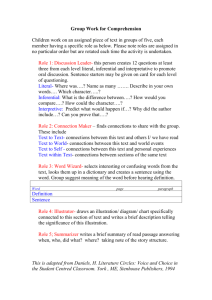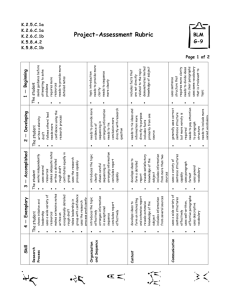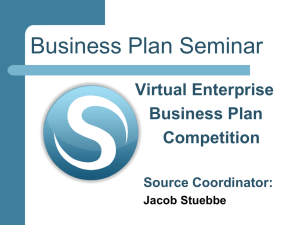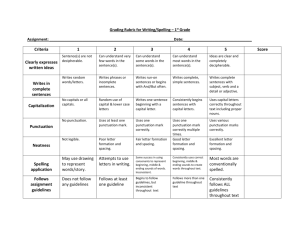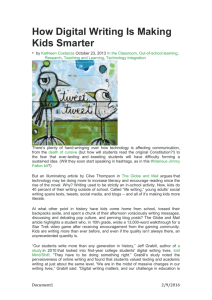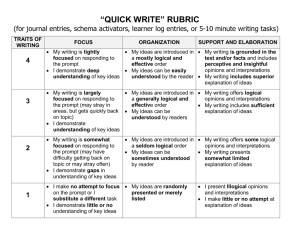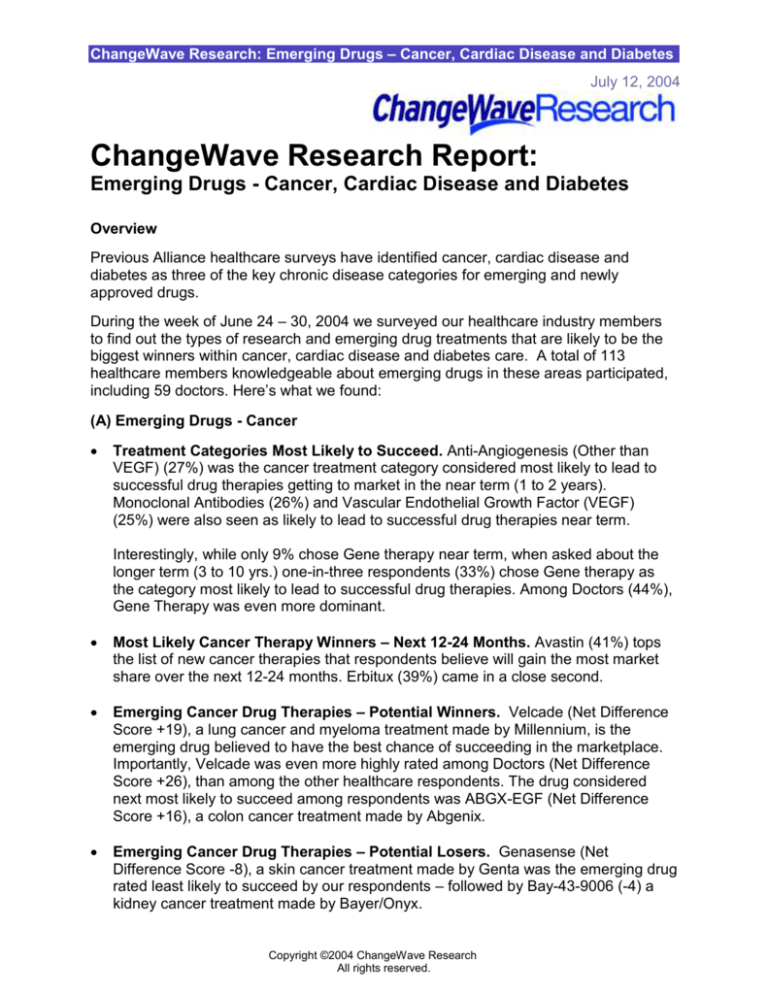
ChangeWave Research: Emerging Drugs – Cancer, Cardiac Disease and Diabetes
July 12, 2004
ChangeWave Research Report:
Emerging Drugs - Cancer, Cardiac Disease and Diabetes
Overview
Previous Alliance healthcare surveys have identified cancer, cardiac disease and
diabetes as three of the key chronic disease categories for emerging and newly
approved drugs.
During the week of June 24 – 30, 2004 we surveyed our healthcare industry members
to find out the types of research and emerging drug treatments that are likely to be the
biggest winners within cancer, cardiac disease and diabetes care. A total of 113
healthcare members knowledgeable about emerging drugs in these areas participated,
including 59 doctors. Here’s what we found:
(A) Emerging Drugs - Cancer
Treatment Categories Most Likely to Succeed. Anti-Angiogenesis (Other than
VEGF) (27%) was the cancer treatment category considered most likely to lead to
successful drug therapies getting to market in the near term (1 to 2 years).
Monoclonal Antibodies (26%) and Vascular Endothelial Growth Factor (VEGF)
(25%) were also seen as likely to lead to successful drug therapies near term.
Interestingly, while only 9% chose Gene therapy near term, when asked about the
longer term (3 to 10 yrs.) one-in-three respondents (33%) chose Gene therapy as
the category most likely to lead to successful drug therapies. Among Doctors (44%),
Gene Therapy was even more dominant.
Most Likely Cancer Therapy Winners – Next 12-24 Months. Avastin (41%) tops
the list of new cancer therapies that respondents believe will gain the most market
share over the next 12-24 months. Erbitux (39%) came in a close second.
Emerging Cancer Drug Therapies – Potential Winners. Velcade (Net Difference
Score +19), a lung cancer and myeloma treatment made by Millennium, is the
emerging drug believed to have the best chance of succeeding in the marketplace.
Importantly, Velcade was even more highly rated among Doctors (Net Difference
Score +26), than among the other healthcare respondents. The drug considered
next most likely to succeed among respondents was ABGX-EGF (Net Difference
Score +16), a colon cancer treatment made by Abgenix.
Emerging Cancer Drug Therapies – Potential Losers. Genasense (Net
Difference Score -8), a skin cancer treatment made by Genta was the emerging drug
rated least likely to succeed by our respondents – followed by Bay-43-9006 (-4) a
kidney cancer treatment made by Bayer/Onyx.
Copyright ©2004 ChangeWave Research
All rights reserved.
ChangeWave Research: Emerging Drugs – Cancer, Cardiac Disease and Diabetes
(B) Emerging Drugs – Cardiac Disease and Stroke
Treatment Categories Most Likely to Succeed. “Combinational Drugs to Lower
Cholesterol and Hypertension” (28%) is the cardiac treatment category considered
most likely to lead to successful drug therapies getting to market near term (1 to 2
years), followed by “Good Cholesterol Boosting Drugs” (27%) and “Cholesterol
Lowering drugs” (27%). Respondents also see “Artery/Vein/Plaque Cleaning Drugs”
(23%) and “Anti-Clogging Drugs” (20%) as having considerable near term potential.
Emerging Cardiac Disease/Stroke Drug Therapies – Lipitor-Torcetrapib Seen
as Most Likely to Succeed. Not surprisingly, the 800 lb. gorilla here is LipitorTorcetrapib (Net Difference Score +37), which was overwhelmingly believed to have
the best chance of succeeding in the cardiac disease/stroke market. Three other
less-well-known emerging drugs also elicited positive responses from respondents:
Exanta (Net Difference Score +6), Accomplia (+4), and EK-216 (+3).
(C) Emerging Drugs - Diabetes
Emerging Diabetes Drug Therapies. Exubera (Net Difference Score +23), the
inhalable insulin made by Nektar/Pfizer, topped the list of diabetes drug therapies
seen as having the best chances of succeeding in the marketplace. Exenatide
(+12) (Amylin/Lilly) also garnered a positive score with regards to its chances for
succeeding in the marketplace.
(D) “New” Science
Future Disease Treatment Areas – Gene-Based Therapy Leads the Way.
Better than one-in-five (22%) respondents chose Gene-based therapy as the most
important “new” science category related to disease treatment that will emerge in
the field of biotech research within the next five years. Other areas that received
significant mention include Monoclonal Antibodies (12%), Stem-cell Research
(12%) and RNA interference (10%).
Bottom Line: A handful of drug treatment categories are considered most likely to
succeed near term including Anti-Angiogenesis (Other than VEGF), Monoclonal
Antibodies & Vascular Endothelial Growth Factor for cancer, along with
Combination Drugs to Lower Cholesterol/Hypertension, “Good” Cholesterol
Boosting Drugs & Cholesterol “Lowering” Drugs for cardiac disease and stroke.
Long term, Gene Therapy is clearly the treatment category seen as likeliest to succeed.
Respondents also see Avastin and Erbitux as the new cancer therapies most likely to
gain market share over the near term. And among emerging drug therapies, Velcade
and ABGX-EGF (cancer), Lipitor-Torcetrapib (cardiac disease and stroke) & Exubera
(diabetes) were seen as having the best chance of succeeding in the marketplace.
The ChangeWave Alliance is a group of 4,500 highly qualified business, technology, and medical professionals in
leading companies of select industries—credentialed professionals who spend their everyday lives working on the
frontline of technological change. ChangeWave surveys its Alliance members on a range of business and investment
research and intelligence topics, collects feedback from them electronically, and converts the information into
proprietary quantitative and qualitative reports.
Helping You Profit From A Rapidly Changing World ™
www.ChangeWaveResearch.com
2
Copyright ©2004 ChangeWave Research
All rights reserved.
ChangeWave Research: Emerging Drugs – Cancer, Cardiac Disease and Diabetes
Table of Contents
Summary of Key Findings ............................................................................................ 4
The Findings .................................................................................................................. 5
(A) Emerging Drugs - Cancer ............................................................................... 6
(B) Emerging Drugs – Cardiac Disease.............................................................. 18
(C) Emerging Drugs – Diabetes.......................................................................... 26
(D) “New” Science .............................................................................................. 28
ChangeWave Research Methodology ....................................................................... 33
About ChangeWave Research ................................................................................... 34
Copyright ©2004 ChangeWave Research
All rights reserved.
3
ChangeWave Research: Emerging Drugs – Cancer, Cardiac Disease and Diabetes
I. Summary of Key Findings
Cancer Therapies
Treatment Categories Most
Likely To Succeed Over
Near Term (1 to 2 yrs):
Anti-Angiogenesis - Other
than VEGF (27%)
Monoclonal Antibodies
(26%)
Vascular Endothelial
Growth Factor –VEGF
(25%)
Advanced Immunotherapy
(23%)
Longer Term (3 to 10 yrs):
Gene Therapy (33%)
New Drug Therapies Most
Likely to Gain Market
Share Next 12-24 Months:
Avastin (41%)
Erbitux (39%)
Cardiac Disease and
Stroke Therapies
Diabetes
Therapies
Treatment Categories Most
Likely To Succeed Over
Near Term (1 to 2 yrs):
Likeliest Winners
Among Emerging
Drugs:
“Combination” drugs to
Lower Cholesterol and
Hypertension (28%)
“Good” Cholesterol
Boosting drugs (27%)
Cholesterol “Lowering”
drugs (27%)
Artery/vein/plaque
cleaning drugs (23%)
Anti-clogging drugs (20%)
Exubera (Net Diff.
=+23)
Exenatide (Net Diff.
= +12)
Likeliest Winner Among
Emerging Drugs:
Lipitor-Torcetrapib
(Net Diff =+37)
Likeliest Winners Among
Emerging Drugs:
Velcade (Net Diff =+19)
Introduction
ABGX-EGF (Net Diff =+16)
Most Important
"New" Science
Categories For
Treatment of
Disease - Next 5
Years
Gene-based therapy
(22%)
Monoclonal Antibodies
(12%)
Stem-cell Research
(12%)
Previous Alliance healthcare surveys have identified cancer, cardiac disease and
diabetes as three of the key chronic disease categories for emerging and newly
approved drugs.
During the week of June 24 – 30, 2004 we surveyed our healthcare industry members
to find out the types of research and emerging drug treatments that are likely to be the
biggest winners within cancer, cardiac disease and diabetes care. A total of 113
healthcare members knowledgeable about emerging drugs in these areas participated,
including 59 doctors. Here’s what we found:
Copyright ©2004 ChangeWave Research
All rights reserved.
4
ChangeWave Research: Emerging Drugs – Cancer, Cardiac Disease and Diabetes
II. The Findings
Emerging Drugs - Cancer, Cardiac Disease and Diabetes
Total Sample Size (n = 113)
Doctors (n = 59)
Other Healthcare Industry Respondents (n = 54)
(A) Cancer Drugs - Emerging and Newly Commercialized
(1) Question Asked: There are several categories of emerging and newly
commercialized cancer drugs. Which of the following treatment categories do you
believe are most likely to lead to successful drug therapies getting to market over
the near term (1 to 2 years)? (Choose No More Than Two)
27%
26%
25%
32%
29%
31%
Other
Healthcare
Industry
Respondents
22%
22%
19%
23%
14%
12%
9%
3%
18%
2%
25%
10%
12%
12%
3%
10%
0%
20%
19%
13%
6%
2%
26%
4%
Total
Doctors
Respondents
Anti-Angiogenesis (Other than VEGF)
Monoclonal Antibodies
Vascular Endothelial Growth Factor (VEGF - a Subset of Anti-Angiogenesis)
Advanced Immunotherapy
Humanized Antibodies
Antisense Therapy
Gene Therapy
None of the Above
Don't Know
Other
Treatment Categories Most Likely to Succeed. Anti-Angiogenesis (Other than VEGF)
(27%) was the cancer treatment category considered most likely to lead to successful
drug therapies getting to market in the near term (1 to 2 years). Monoclonal Antibodies
(26%) and Vascular Endothelial Growth Factor (VEGF) (25%) were also seen as likely
to lead to successful drug therapies near term.
Interestingly, while only 9% chose Gene therapy near term, when asked about the
longer term (3 to 10 yrs.) one-in-three respondents (33%) chose Gene therapy as the
category most likely to lead to successful drug therapies. Among Doctors (44%), Gene
Therapy was even more dominant.
(1A) Question Asked: Why? (Actual Responses in Appendix A, page 20)
Copyright ©2004 ChangeWave Research
All rights reserved.
5
ChangeWave Research: Emerging Drugs – Cancer, Cardiac Disease and Diabetes
(2) Question Asked: What about over the longer term (3 to 10 years)? Which of
the following cancer treatment categories do you believe will prove most
successful in getting drug therapies to market? (Choose No More Than Two)
33%
20%
19%
19%
12%
44%
24%
19%
24%
7%
Other
Healthcare
Industry
Respondents
20%
17%
49%
13%
19%
12%
12%
1%
18%
4%
12%
12%
0%
12%
2%
11%
11%
2%
24%
7%
Total
Doctors
Respondents
Gene Therapy
Advanced Immunotherapy
Anti-Angiogenesis (Other than VEGF)
Monoclonal Antibodies
Vascular Endothelial Growth Factor (VEGF - a Subset of Anti-Angiogenesis)
Humanized Antibodies
Antisense Therapy
None of the Above
Don't Know
Other
Gene Therapy Dominates Longer Term. When asked about the longer term (3 to 10
yrs.) one-in-three respondents (33%) chose Gene therapy as the category most likely to
lead to successful drug therapies. Among Doctors (44%), Gene Therapy was even
more dominant.
(3) Question Asked: Several new cancer therapies have been approved or appear
likely to receive approval. Which of the following new cancer therapies do you
believe will gain the most market share over the next 12-24 months? (Choose No
More Than Two)
Total
Doctors
Respondents
Avastin
Erbitux
Gleevec
Tarceva
Provenge
Satraplatin
None of the Above
Don't Know
Other
41%
39%
15%
8%
3%
2%
0%
33%
1%
41%
42%
14%
10%
5%
3%
0%
29%
0%
Other
Healthcare
Industry
Respondents
41%
35%
17%
6%
0%
0%
0%
37%
2%
Copyright ©2004 ChangeWave Research
All rights reserved.
6
ChangeWave Research: Emerging Drugs – Cancer, Cardiac Disease and Diabetes
Most Likely Cancer Therapy Winners – Next 12-24 Months. Avastin (41%) tops the
list of new cancer therapies that respondents believe will gain the most market share
over the next 12-24 months. Erbitux (39%) came in a close second.
(4A) Question Asked: There are other emerging cancer drugs that have recently
garnered attention due to news headlines, the release of data, granting of Fast
Track approval status, etc. Which of these cancer drug therapies do you think
have the best chance of succeeding in the marketplace? (Choose No More Than
Two)
Velcade (Lung Cancer and Myeloma
treatment made by Millenium)
ABGX-EGF (Colon Cancer treatment made
by Abgenix)
Genasense (Skin Cancer treatment made by
Genta)
PTK-787 (Colon Cancer treatment made by
Novartis)
GSK 572016 (Breast/Bladder Cancer
treatment made by GSK)
SU11248 (Stomach, Kidney Cancer
treatment made by Pfizer)
Bay-43-9006 (Kidney Cancer treatment
made by Bayer/Onyx)
Revlimid (Blood Cancer treatment made by
Celgene)
Telcyta (Ovarian Cancer treatment made by
Telik)
None of the Above
Don’t Know
Other
Other
Total
Healthcare
Doctors
Respondents
Industry
Respondents
25%
29%
20%
19%
20%
19%
5%
3%
7%
11%
8%
13%
4%
7%
2%
8%
8%
7%
1%
2%
0%
4%
7%
2%
2%
2%
2%
1%
0%
2%
44%
42%
46%
2%
0%
4%
Copyright ©2004 ChangeWave Research
All rights reserved.
7
ChangeWave Research: Emerging Drugs – Cancer, Cardiac Disease and Diabetes
(4B) Question Asked: Which of these cancer drug therapies do you think have the
least chance of succeeding in the marketplace? (Choose No More Than Two)
Total
Respondents
Genasense (Skin Cancer treatment
made by Genta)
Velcade (Lung Cancer and Myeloma
treatment made by Millenium)
Bay-43-9006 (Kidney Cancer treatment
made by Bayer/Onyx)
SU11248 (Stomach, Kidney Cancer
treatment made by Pfizer)
Telcyta (Ovarian Cancer treatment made
by Telik)
ABGX-EGF (Colon Cancer treatment
made by Abgenix)
Revlimid (Blood Cancer treatment made
by Celgene)
PTK-787 (Colon Cancer treatment made
by Novartis)
GSK 572016 (Breast/Bladder Cancer
treatment made by GSK)
None of the Above
13%
Don’t Know
Other
Other
Healthcare
Doctors
Industry
Respondents
14%
13%
6%
3%
9%
5%
2%
9%
4%
5%
4%
4%
5%
4%
3%
3%
2%
2%
2%
2%
1%
0%
2%
0%
0%
0%
1%
0%
2%
58%
63%
52%
0%
0%
0%
Copyright ©2004 ChangeWave Research
All rights reserved.
8
ChangeWave Research: Emerging Drugs – Cancer, Cardiac Disease and Diabetes
Cancer Drug Therapies – Chance of Succeeding in the Marketplace – Net
Difference Score
Total
Respondents
Net
Difference
Score
Velcade (Lung Cancer and Myeloma
treatment made by Millenium)
ABGX-EGF (Colon Cancer treatment
made by Abgenix)
PTK-787 (Colon Cancer treatment made
by Novartis)
GSK 572016 (Breast/Bladder Cancer
treatment made by GSK)
SU11248 (Stomach, Kidney Cancer
treatment made by Pfizer)
Revlimid (Blood Cancer treatment made
by Celgene)
Telcyta (Ovarian Cancer treatment made
by Telik)
Bay-43-9006 (Kidney Cancer treatment
made by Bayer/Onyx)
Genasense (Skin Cancer treatment
made by Genta)
+19
Other
Healthcare
Doctors
Industry
Net
Respondents
Difference
Net
Score
Difference
Score
+26
+11
+16
+17
+17
+10
+8
+11
+4
+7
+2
+4
+3
+3
+2
+5
0
-2
-3
-2
-4
0
-9
-8
-10
-5
Emerging Cancer Drug Therapies – Potential Winners. Velcade (Net Difference
Score +19), a lung cancer and myeloma treatment made by Millenium, is the emerging
drug believed to have the best chance of succeeding in the marketplace. Importantly,
Velcade was even more highly rated among Doctors (Net Difference Score +26), than
among the other healthcare respondents.
The drug considered next most likely to succeed among respondents was ABGX-EGF
(Net Difference Score +16), a colon cancer treatment made by Abgenix.
Emerging Cancer Drug Therapies – Potential Losers. Genasense (Net Difference
Score -8), a skin cancer treatment made by Genta was the emerging drug rated least
likely to succeed by our respondents – followed by Bay-43-9006 (-4) a kidney cancer
treatment made by Bayer/Onyx.
Copyright ©2004 ChangeWave Research
All rights reserved.
9
ChangeWave Research: Emerging Drugs – Cancer, Cardiac Disease and Diabetes
(B) Cardiac Disease and Stroke Drugs - Emerging and Newly
Commercialized
(5) Question Asked: There are several categories of emerging and newly
commercialized cardiac disease & stroke drugs. Which of the following treatment
categories do you believe are most likely to lead to successful drug therapies
getting to market over the near term (1 to 2 years)? (Choose No More Than Two)
Combinational drugs to lower cholesterol
and hypertension
Good cholesterol boosting drugs
28%
36%
Other
Healthcare
Industry
Respondents
20%
27%
27%
28%
Cholesterol lowering drugs
27%
24%
31%
Artery/vein/plaque cleaning drugs
23%
29%
17%
Anti-clogging drugs
20%
19%
22%
Anti-hypertension drugs
12%
10%
15%
Neurological based anti-stroke drugs
5%
8%
2%
None of the Above
0%
0%
0%
11%
10%
11%
4%
0%
7%
Total
Respondents
Don't Know
Other
Doctors
Treatment Categories Most Likely to Succeed. “Combinational Drugs to Lower
Cholesterol and Hypertension” (28%) is the cardiac treatment category considered most
likely to lead to successful drug therapies getting to market near term (1 to 2 years),
followed by “Good Cholesterol Boosting Drugs” (27%) and “Cholesterol Lowering drugs”
(27%). Respondents also see “Artery/Vein/Plaque Cleaning Drugs” (23%) and “AntiClogging Drugs” (20%) as having considerable near term potential.
(5A) Question Asked: Why? (Actual Responses in Appendix B, page 27)
Copyright ©2004 ChangeWave Research
All rights reserved.
10
ChangeWave Research: Emerging Drugs – Cancer, Cardiac Disease and Diabetes
(6A) Question Asked: Let's focus on emerging and newly commercialized cardiac
disease/stroke drugs that have been garnering attention of late. Which of these
cardiac disease/stroke drug therapies do you think have the best chance of
succeeding in the marketplace? (Choose No More Than Two)
Lipitor-Torcetrapib (made by Pfizer)
Exanta (made by Astra-Zeneca)
Acomplia (made by Senofi-Synthelabo)
EK-216 (made by Pfizer)
AGI-1007 (made by Atherogencs)
SPP100 (made by Novartis)
Sitaxsentan (made by Encysive)
DG031 (made by Decode Genetics)
GSK 480848 (made by GSK)
None of the Above
Don’t Know
Total
Respondents
Doctors
41%
8%
6%
4%
4%
3%
2%
2%
1%
2%
39%
44%
5%
7%
5%
5%
3%
2%
0%
0%
0%
41%
Other
Healthcare
Industry
Respondents
37%
11%
6%
4%
2%
2%
2%
4%
2%
4%
37%
(6B) Question Asked: Which of these cardiac disease/stroke drug therapies do
you think have the least chance of succeeding in the marketplace? (Choose No
More Than Two)
GSK 480848 (made by GSK)
Lipitor-Torcetrapib (made by Pfizer)
Sitaxsentan (made by Encysive)
AGI-1007 (made by Atherogencs)
Acomplia (made by Senofi-Synthelabo)
Exanta (made by Astra-Zeneca)
SPP100 (made by Novartis)
DG031 (made by Decode Genetics)
EK-216 (made by Pfizer)
None of the Above
Don’t Know
Other
Total
Respondents
Doctors
4%
4%
4%
3%
2%
2%
2%
1%
1%
1%
73%
0%
3%
3%
3%
2%
0%
2%
0%
2%
2%
2%
80%
0%
Copyright ©2004 ChangeWave Research
All rights reserved.
Other
Healthcare
Industry
Respondents
4%
4%
4%
4%
4%
2%
4%
0%
0%
0%
65%
0%
11
ChangeWave Research: Emerging Drugs – Cancer, Cardiac Disease and Diabetes
Cardiac Disease/Stroke Drugs – Chance of Succeeding in the Marketplace – Net
Difference Score
Total
Respondents
Net
Difference
Score
Lipitor-Torcetrapib (made by Pfizer)
Exanta (made by Astra-Zeneca)
Acomplia (made by Senofi-Synthelabo)
EK-216 (made by Pfizer)
AGI-1007 (made by Atherogencs)
DG031 (made by Decode Genetics)
SPP100 (made by Novartis)
Sitaxsentan (made by Encysive)
GSK 480848 (made by GSK)
+37
+6
+4
+3
+1
+1
+1
-2
-3
Other
Healthcare
Doctors
Industry
Net
Respondents
Difference
Net
Score
Difference
Score
+41
+33
+3
+9
+7
+2
+3
+4
+3
-2
-2
+4
+3
-2
-1
-2
-3
-2
Emerging Cardiac Disease/Stroke Drug Therapies – Lipitor-Torcetrapib Seen as
Most Likely to Succeed. Not surprisingly, the 800 lb. gorilla here is Lipitor-Torcetrapib
(Net Difference Score +37), which was overwhelmingly believed to have the best
chance of succeeding in the cardiac disease/stroke market.
Three other less-well-known emerging drugs also elicited positive responses from
respondents: Exanta (Net Difference Score +6), Accomplia (+4), and EK-216 (+3).
Copyright ©2004 ChangeWave Research
All rights reserved.
12
ChangeWave Research: Emerging Drugs – Cancer, Cardiac Disease and Diabetes
(C) Diabetes Drugs - Emerging and Newly Commercialized
(7A) Question Asked: Last but not least, let's focus on emerging and newly
commercialized diabetes drugs that have been garnering attention of late.
Which of these diabetes drug therapies do you think have the best chance
of succeeding in the marketplace? (Choose No More Than Two)
Total
Respondents
Exubera (inhalable insulin)
(made by Nektar/Pfizer)
Exenatide (made by Amylin/Lilly)
MK-0431 (made by Merck)
Galida (made by Atra Zeneca)
Murgalitazor (made by Bristol Myers)
LAF237 (made by Novartis)
None of the Above
Don’t Know
Other
27%
15%
4%
3%
3%
1%
1%
48%
1%
Other
Healthcare
Doctors
Industry
Respondents
25%
30%
14%
2%
5%
3%
0%
0%
54%
0%
17%
7%
0%
2%
2%
2%
41%
2%
(7B) Question Asked: Which of these diabetes drug therapies do you think have
the least chance of succeeding in the marketplace? (Choose No More Than Two)
Total
Respondents
Murgalitazor (made by Bristol Myers)
Galida (made by Atra Zeneca)
Exubera (inhalable insulin)
(made by Nektar/Pfizer)
Exenatide (made by Amylin/Lilly)
LAF237 (made by Novartis)
MK-0431 (made by Merck)
None of the Above
Don’t Know
Other
8%
4%
4%
3%
3%
3%
1%
69%
0%
Copyright ©2004 ChangeWave Research
All rights reserved.
Other
Healthcare
Doctors
Industry
Respondents
7%
9%
5%
4%
3%
6%
2%
3%
3%
2%
78%
0%
4%
2%
2%
0%
59%
0%
13
ChangeWave Research: Emerging Drugs – Cancer, Cardiac Disease and Diabetes
Diabetes Drug Therapies – Chance of Succeeding in the Marketplace – Net
Difference Score
Total
Respondents
Net
Difference
Score
Other
Healthcare
Doctors
Industry
Net
Respondents
Difference
Net
Score
Difference
Score
+22
+24
Exubera (inhalable insulin)
(made by Nektar/Pfizer)
Exenatide (made by Amylin/Lilly)
+23
+12
+12
+13
MK-0431 (made by Merck)
+1
-1
+5
Galida (made by Atra Zeneca)
-1
0
-4
LAF237 (made by Novartis)
-2
-3
0
Murgalitazor (made by Bristol Myers)
-5
-4
-7
Emerging Diabetes Drug Therapies. Exubera (Net Difference Score +23), the
inhalable insulin made by Nektar/Pfizer, topped the list of diabetes drug therapies seen
as having the best chances of succeeding in the marketplace. Exenatide (+12)
(Amylin/Lilly) also garnered a positive score with regards to its chances for succeeding
in the marketplace.
Copyright ©2004 ChangeWave Research
All rights reserved.
14
ChangeWave Research: Emerging Drugs – Cancer, Cardiac Disease and Diabetes
(D) “New” Science
(8) Question Asked: Here's a quick brain teaser: Biotech Investment dollars and
attention typically flow to “new” science categories like RNA interference. In your
opinion, what is the most important "new" science category(s) related to the
treatment of disease that will emerge in biotech research within the next five
years?
Gene-based Therapy
Monoclonal Antibodies
Stem-cell Research
RNA interference
Anti-Angiogenesis
Nanotech Imaging/Tumor Detection & Treatment
Delivery Systems/”Targeted” Therapies
Obesity-related Therapy
Antisense Therapy
Diabetes Treatments
Other
22%
12%
12%
10%
8%
8%
7%
3%
3%
3%
20%
Future Disease Treatment Areas – Gene-Based Therapy Leads the Way. Better
than one-in-five (22%) respondents chose Gene-based therapy as the most important
“new” science category related to disease treatment that will emerge in the field of
biotech research within the next five years. Other areas that received significant
mention include Monoclonal Antibodies (12%), Stem-cell Research (12%) and RNA
interference (10%).
A bit further back in terms of percentage response we find Anti-Angiogenesis (8%),
Nanotech Imaging/Tumor Detection & Treatment (8%) and Delivery Systems/”Targeted”
Therapies (7%).
Sample of Alliance Member Responses:
(a) Gene-based Therapy (22%)
MAM7387 writes, “Gene therapy.”
VIT1251 writes, “Gene therapy.”
AIZ9720 writes, “Gene therapy and stroke research - both are far behind and stroke
has garnered more and more controversy on treatment plans and efficacy as well
as multiple lawsuits for not providing non-standard of care practices.”
MTA6607 writes, “GENE Prevention & tailoring of drugs.”
DAV3892 writes, “Genetically designed drugs.”
CRL0022 writes, “Genomic assays to tailor drugs to the individual patient.”
Copyright ©2004 ChangeWave Research
All rights reserved.
15
ChangeWave Research: Emerging Drugs – Cancer, Cardiac Disease and Diabetes
TDA3174 writes, “Gene identification and treatment for specific metabolic diseases
like Diabetes.”
GUT8640 writes, “Individualized gene therapy.”
DRU7021 writes, “More effective gene therapy.”
TJL1121 writes, “Targeted gene therapy.”
WJH7828 writes, “The application of gene therapy is such a large job that it will be
front and center for many years. When faced with such a huge number of
opportunities, it will take time to work through and it can't be dismissed as old
science.”
DR.8915 writes, “This is a tough one and I will have to give you three answer that
overlap somewhat. Gene therapy, tissue engineering and biologically based nano
technology (nanobiotechnology). The reason I give you all three is that I believe
Tissue engineering and biologically based nanobots proteins designed top perform
a specific function will be used to correct and replace defective genes, regrow and
repair damaged organs and even restore the telomeres to cells in effect resetting
the cell clock preventing apoptosis (programmed cell death) resulting in greatly
increased life spans and quality of life.”
GOP2712 writes, “Gene therapy.”
(b) Monoclonal Antibodies (12%)
BER2807 writes, “Drugs against cancer using monoclonal antibodies.”
WSU8151 writes, “Humanized monoclonal antibodies, and especially- stimulation of
the individual's own immune system to destroy cancer will lead future therapy.
Remember that your own immune system removes cancer constantly from our
bodies and only rarely fails. So far nature has out done our science, but we can try
to catch up.”
NIN8017 writes, “Humanized antibodies.”
SCM5876 writes, “New science related to human antibodies cancer micro-array
profiling data from tumor samples to help physicians with treatment plans for
patients and to group patients for drug developers (see www.agendia.com) not RNA
interference.”
KLL5671 writes, “Monoclonal antibodies.”
TDA3174 writes, “Monoclonal antibodies for cancer prevention.”
Copyright ©2004 ChangeWave Research
All rights reserved.
16
ChangeWave Research: Emerging Drugs – Cancer, Cardiac Disease and Diabetes
(c) Stem-cell Research (12%)
SBE5857 writes, “Apoptosis modulators and generating biologically active
molecules (proteins, etc.) using stem cells instead of monoclonal productions for
humanization.”
GOL8321 writes, “I don't think it's new, but with attention focused on stem cell
research and the ability to extend and or improve quality of life, this will certainly be
a major area of scrutiny.”
MIN9289 writes, “Producing cloned or synthetic tissues that can be used as
replacements.”
JMA0132 writes, “Stem cell research - primordial cell controlled activation.”
SSR9050 writes, “Stem cell therapy.”
KLL5671 writes, “Stem cells.”
LSA5734 writes, “Stem cell therapies.”
(d) RNA interference (10%)
BOB2633 writes, “RNA interference will be dominant in setting new drug targets for
the biotech and drug industries.”
KUR3102 writes, “RNAi.”
WSU8151 writes, “RNAi.”
WRT9962 writes, “Well, you hit one...RNAi.”
EGF6017 writes, “There will be a split between Hi tech RNAi and low tech
Neutraceutics.”
(e) Anti-angiogenesis (8%)
DON7620 writes, “Anti-angiogenesis therapy.”
EAG2774 writes, “I like anti angiogenesis.”
POR7751 writes, “Natural angiogenesis inhibitor promoting drugs which are
currently available - like celebrex (see some of Judah Faulkmans work in this field).”
FRE9804 writes, “New anti-angiogenesis drugs to restrict blood flow to tumors in
combination with chemo agents.”
Copyright ©2004 ChangeWave Research
All rights reserved.
17
ChangeWave Research: Emerging Drugs – Cancer, Cardiac Disease and Diabetes
(f) Nanotech Imaging/Tumor Detection & Treatment (8%)
CE60483 writes, “Directed and focused ultrasound waves to treat solid tumors.”
JRJ9829 writes, “Nanotech for imaging and treatment (e.g. tumors).”
SHA3342 writes, “Nano tech.”
GAB1482 writes, “Nanoparticles in treating solid cancerous cells.”
(g) Delivery Systems/ “Targeted” Therapy (7%)
BOL2762 writes, “Targeted drug delivery systems.”
WRT9962 writes, “I think targeted therapies are definitely ascendant. Iressa works,
but for a subset of patients. For everyone else, it's no help at all. Figuring out for
whom individual drugs work is going to keep growing in importance.”
JSA8571 writes, “Targeting second messenger molecules like gleevec.”
GAB1482 writes, “Targeted delivery system.”
(h) Obesity-related Therapy (3%)
WOO7602 writes, “Appetite suppression with newly described hormones involved in
satiety. This will become the biggest drug expenditure ever (BY FAR). If we are not
successful at treating the obesity epidemic, the entire federal budget (and economy)
will almost certainly crash.”
BPP8880 writes, “Weight control, loss, medications. I currently work in a Bariactric
Clinic, using drugs that have been around for over 30-40 years with mixed results.
With the current media, government, and corp. concerns with rising cost of health
care a new drug (that works, with limited side effects) will be huge. Don't believe
me? Research the sales of Phen-Phen before it was pulled.”
(i) Antisense Therapy (3%)
LKB3320 writes, “Antisense drugs.”
FSC4718 writes, “Anti-sense products.”
Copyright ©2004 ChangeWave Research
All rights reserved.
18
ChangeWave Research: Emerging Drugs – Cancer, Cardiac Disease and Diabetes
(j) Diabetes Treatments (3%)
SER5830 writes, “Diabetes diagnostics and therapeutics related to a new paradigm
dealing with reversing the cause of insulin resistance that occurs during processing
of a meal (not the current focus on the fasted state).”
(k) Other (20%)
FER6743 writes, “The treatment developed by Esperion bought by Pfizer-the socalled Giovanni's Mutation.”
2464180 writes, “Autologous Replacement organs.”
MLD0455 writes, “Biologic anti-inflammatory drugs like embrel.”
MFR1216 writes, “Cell hormone receptor modification.”
TIS3735 writes, “Decreasing the cost and time to get drugs into Phase II, and
obviously this will impact all diseases. This is not related to changes in practices;
this will be driven by new and emerging technologies.”
DAV7815 writes, “Drugs that accelerate the holistic approach should be the most
successful. Silly things like liver cleansing can't be patented but drugs that
effectuate it are.”
BOB3328 writes, “Prostate cancer drugs.”
GDA7384 writes, “Intensive immunotherapy.”
LON6196 writes, “Revirus done by companies like Oncolytics (ONCY).”
ELK5836 writes, “The Magic Bullet concept which will enable the medical world to
treat a multitude of illnesses.”
DDE4469 writes, “The connection of inflammation to cardiac and stroke disease
risk.”
CRA1451 writes, “Antibiotics.”
Copyright ©2004 ChangeWave Research
All rights reserved.
19
ChangeWave Research: Emerging Drugs – Cancer, Cardiac Disease and Diabetes
Appendix A – Cancer Drug Treatments
Question Asked: There are several categories of emerging and newly
commercialized cancer drugs. Which of the following treatment categories do you
believe are most likely to lead to successful drug therapies getting to market over
the near term (1 to 2 years)? Why?
Sample of Alliance Member Responses:
(a) Anti-Angiogenesis (Other than VEGF) (27%)
GRA1199 writes, "Needed."
IND7726 writes, "Most specific (Mabs) and non-crossover (anti-angiogenesis)."
KUR3102 writes, "These show much clinical efficacy."
SER5830 writes, "They are far enough into the pipeline and there are a number of
competing groups.”
BPB4890 writes, "Have been through the Phase I and II trials."
GAN3623 writes, "Because at least 1 is in phase III testing and looks quite
promising."
PAV0359 writes, "Most likely to be approved by FDA."
SCM5876 writes, "The best are anti-angiogenesis and humanized antibodies.
(note: It has to be anti-VEGF or it will help cancer formation.) Humanized antibodies
are adapted monoclonal antibodies. Gene therapy is a long way off and I would
question whether or not antisense therapy works at all. Not quite sure what you
mean by advanced immunotherapy."
EAG2774 writes, "They’re the most promising from what I read."
GRE3148 writes, "Demonstrable efficacy of recently introduced products and others
like Tarceva which will undoubtedly be approved based on recent trial data."
DRJ5952 writes, "They work well."
ELK5836 writes, "Reduced research time, reduced FDC authorization time."
PHA0200 writes, "I did some research in angiogenesis years ago and am aware of
some cancer drugs aiming at cutting off the blood supplies to cancerous cells."
BCA3438 writes, “Proven track record of Avastin and other targeted bio-therapies
(see NEJM article, June 8 2004) coupled with several Anti-VEGF molecules in the
pipeline.”
Copyright ©2004 ChangeWave Research
All rights reserved.
20
ChangeWave Research: Emerging Drugs – Cancer, Cardiac Disease and Diabetes
LSA5734 writes, “Closer to mainstream use.”
(b) Monoclonal Antibodies (26%)
ANS3402 writes, "Monoclonals have historically had a good chance of completing
clinical trials -certainly more successful than standard "small molecule" treatments.
It maybe too early for the other therapies mentioned-5 years sounds about right."
SSR9050 writes, "Most likely to yield near term results."
IND7726 writes, "Most specific (Mabs) and non-crossover (anti-angiogenesis)."
BPB4890 writes, "Have been through the Phase I and II trials."
MIN9289 writes, "Current trials in these areas are closest to realizing immediately
useful data (Phase III trials close to completion)."
CRL0022 writes, "Less toxic and more specific."
STE3218 writes, "Monoclonal technology has advanced rapidly and with elimination
of the antibody tail, they have virtually eliminated the problem with allergic
reactions."
SPE2818 writes, "Targets specific cancers."
MFR1216 writes, "These are established modalities with good clinical background
and significant market potential."
DRC3209 writes, "Monoclonal antibodies attack the target molecule and only the
target molecule, with no or greatly diminished side effects."
KLL5671 writes, "Researchers have been working with monoclonal antibodies for
almost 20 years and some of them have been successful in targeting certain cancer
cells."
JPI5528 writes, "Looks like the most promising directed treatment."
FSC4718 writes, "Phase 2 trials look promising."
MDT5845 writes, “Recent successes such as rituxin...”
(c) Vascular Endothelial Growth Factor (VEGF) (25%)
EDE6617 writes, "Get closest to the real problem."
WSU8151 writes, "Advancement of cancer therapy will become more prominent as
more baby boomers head toward retirement age. Traditional chemotherapy will be
augmented by new small molecule drugs in the vegf as well as cancer vaccines
Copyright ©2004 ChangeWave Research
All rights reserved.
21
ChangeWave Research: Emerging Drugs – Cancer, Cardiac Disease and Diabetes
using the patient's own immune system."
KUR3102 writes, "These show much clinical efficacy."
MIN9289 writes, "Current trials in these areas are closest to realizing immediately
useful data (Phase III trials close to completion)."
WJH7828 writes, "Cancer is such a multifaceted condition that it must be attacked
in the few common pathways that exist named angiogenesis the current work on
VEGF has been promising and should extend to many different types of cancer.
Aside from common pathways, you need to be very specific - down to the individual
tumor - for immunotherapy. Individual tumor vaccines or "training" of cellular
elements also is promising."
MTA6607 writes, "More promising reports & results in research lab."
MFR1216 writes, "These are established modalities with good clinical background
and significant market potential."
VIT1251 writes, "Safe and effective."
EAG2774 writes, "There the most promising from what I read."
GRE3148 writes, "Demonstrable efficacy of recently introduced products and others
like Tarceva which will undoubtedly be approved based on recent trial data."
DRJ5952 writes, "They work well."
DR.8915 writes, "There are multiple factors involved in angiogenesis both inducing
and inhibitory. These include VEGF and Vascular Permeability Factor (VPF) as
well as fibroblast and epidermal growth factor. Of these VEGF is the most potent. It
acts by stimulating at least three receptor subtypes on the EC plasma membrane
VEGF-R1, VEGF-R2 and neuropilin-1. Medications that inhibit this growth factor or
target the receptors will be powerful therapy for Breast, prostate bladder, colorectal
and neuroblastoma to mention a few."
JPI5528 writes, "Looks like the most promising directed treatment."
CLI1209 writes, "Clear benefits with minimal adverse events well demonstrated in
large clinical trials; close to launch & approval."
TJL1121 writes, "Phase II & III trials coming to a favorable end."
ARL3034 writes, “The more natural, the better - people are rejecting harmful drugs.”
LSA5734 writes, “Closer to mainstream use.”
Copyright ©2004 ChangeWave Research
All rights reserved.
22
ChangeWave Research: Emerging Drugs – Cancer, Cardiac Disease and Diabetes
(d) Advanced Immunotherapy (23%)
SSR9050 writes, "Most likely to yield near term results."
GRA1199 writes, "Needed."
RJR3451 writes, "R & D."
DAV7815 writes, "Most cancers are systemic in origin and cut and burn is mostly
wrong in my opinion."
JMA0132 writes, "Increased knowledge of the genome will lead to some
advancements in immunotherapy."
WRT9962 writes, "VERY powerful in the test tube and few (so far!) side effects
(known!!)...much to learn yet, tho..."
WID2493 writes, "Most positive to date in trials."
BOB3328 writes, "Theory says it should work."
WJH7828 writes, "Aside from common pathways, you need to be very specific down to the individual tumor - for immunotherapy. Individual tumor vaccines or
"training" of cellular elements also is promising."
CE60483 writes, "Because 3m has a drug already that cause the body to increase
tnf and IL1 to kill basal cell on skin. It works well and if it works here good chance
this line of research will produce more drugs for different cancers sooner than other
modes of action, therefore I think this category will produce the biggest successful
drugs and money first."
NIN8017 writes, "It’s the most promising and wide ranging treatment field."
SHA3342 writes, "Advanced immunotherapy like provenge Phase III studies
showed statistically significant results."
GDA7384 writes, "From a purely logical view of pathology, the only real sustainable
answer lies with methods designed to enhance host immune function. Gene
therapy results have been disappointing to date. Monoclonals similar, and 'old hat'.
Angiogenesis modifiers may have value but must be combined with more damaging
chemotherapeutic compounds."
ELK5836 writes, "Reduced research time, reduced FDC authorization time."
TJL1121 writes, "Phase II & III trials coming to a favorable end."
FER6743 writes, "This would seem to be the most physiologic approach. It has a
large historical basis in the medical cure or prevention of various diseases."
Copyright ©2004 ChangeWave Research
All rights reserved.
23
ChangeWave Research: Emerging Drugs – Cancer, Cardiac Disease and Diabetes
DDE4469 writes, “So far genetic research is not giving us the inroads we
anticipated. That is not to say it will not in the future. We are improving our
knowledge base through genetic research, but effective treatment, targeted via
genes, still eludes us. the strides we are making in assisting the immune system
seems to hold the most promise for minimal side effects and results sooner than
later. Angiogenesis is also promising, but lagging.”
(e) Humanized Antibodies (14%)
RJR3451 writes, "R & D."
TIS3735 writes, "Your categories are a bit odd- no-one would use a non-humanized
antibody any more, and the anti-angiogenesis (a-VEGF included) are all antibody
approaches. So 'humanized antibodies' covers the first 3 categories."
NIN8017 writes, "It’s the most promising and wide ranging treatment field."
SCM5876 writes, "The first four are all antibodies and so are similar and working
well. The best are anti-angiogenesis and humanized antibodies. (note: It has to be
anti-VEGF or it will help cancer formation.) Humanized antibodies are a adapted
monoclonal antibodies. Gene therapy is a long way off and I would question
whether or not antisense therapy works at all. Not quite sure what you mean by
advanced immunotherapy."
CLI1209 writes, "Clear benefits with minimal adverse events well demonstrated in
large clinical trials; close to launch & approval."
(f) Antisense Therapy (12%)
SER5830 writes, "They are far enough into the pipeline and there are a number of
competing groups.”
BOB3328 writes, "Theory says it should work."
WRT9962 writes, "VERY powerful in the test tube and few (so far!) side effects
(known!!)...much to learn yet, tho..."
LEO7024 writes, "Trials seem to be more encouraging."
MTA6607 writes, "More promising reports & results in research lab."
FSC4718 writes, "Phase 2 trials look promising."
(g) Gene Therapy (9%)
EDE6617 writes, "Get closest to the real problem."
WID2493 writes, "Most positive to date in trials."
Copyright ©2004 ChangeWave Research
All rights reserved.
24
ChangeWave Research: Emerging Drugs – Cancer, Cardiac Disease and Diabetes
CRL0022 writes, "Less toxic and more specific."
DLE4329 writes, "Tolerance develops unless there is genetic intervention."
VIT1251 writes, "Safe and effective."
PHA0200 writes, "Gene therapy is most specific and should yield cures if the
defective DNA can be identified. It can even correct defects before diseases
appear; the technology is identify those at risks are being developed."
ARL3034 writes, “The more natural, the better - people are rejecting harmful drugs.”
(h) Other (2%)
LON6196 writes, "It attacks the cancerous cells while protecting the good ones."
BUC1834 writes, "It’s a painfully slow process."
Appendix B – Cardiac Disease and Stroke Drug Treatments
Question Asked: There are several categories of emerging and newly
commercialized cardiac disease & stroke drugs. Which of the following treatment
categories do you believe are most likely to lead to successful drug therapies
getting to market over the near term (1 to 2 years)? Why?
Sample of Alliance Member Responses:
(a) Combinational drugs to lower cholesterol and hypertension (28%)
WIL5353 writes, "To extend patents of some statins."
MIN9289 writes, "Phase I and II trials (and prelim phase III results) are extremely
promising in these areas and the bang for the buck on the HDL raiser will be huge."
MTA6607 writes, "We are already seeing benefits of drugs to lower Cholesterol &
hypertension, & anti-clotting agents such as ASPIRIN."
GAN3623 writes, "I feel that other approaches are more than 2 years from clinical
use."
KLL5671 writes, "These drugs are already in existence individually and clinical trials
on their combinations have been positive."
CE60483 writes, "These combo drugs contain drugs already FDA approved so
getting them to market will be fast and ez. They will be price just under the price of
both drugs if bought separately and will grab market share fast like the multi drug
inhaler market. Patient will ask for them because they pay one copay to insurance.
Copyright ©2004 ChangeWave Research
All rights reserved.
25
ChangeWave Research: Emerging Drugs – Cancer, Cardiac Disease and Diabetes
Any drug that will boost hdl will be accepted rapidly if side effect profile is good. Not
like niacin."
TDA3174 writes, "There is already a large public awareness of "cholesterol lowering
drugs." So more and better agents in this group has less ignorance (patient) to
overcome. Also it is widely accepted that chol. and trig are involved in ASHD and
HTN...both cause narrowing and hardening of arteries."
DLE4329 writes, “There are binary interactions in heart disease."
DRC3209 writes, "Cardiac Disease caused by cholesterol, hypertension and
clogging."
2464180 writes, "The data is in for the cholesterol lowering and anti-hypertension
drugs. When the data comes in for the artery vein plaque cleaning drugs, and the
good cholesterol boosting drugs, IF the FDA and Pfizer and competitors do not
sandbag the public by over limiting the indications, these will be the ultimate block
busters."
NIN8017 writes, "Discussions with colleagues."
GDA7384 writes, "Tackling multiple aspects of metabolic syndrome with a
combination product has to be the way to go. Furthermore, the prospect of avoiding
surgery by removing plaque is equally appealing."
BUC1834 writes, "Already crowded market-combo drugs are an easy sell."
DR.8915 writes, "Established therapies with good track records. In my experience
people like to take fewer pills. Combination drugs are very popular."
DDE4469 writes, “Traditional thinking. Accepted practice is hard to change.”
CRA1451 writes, “Profits & Direct ads.”
(b) Good cholesterol boosting drugs (27%)
SSR9050 writes, "hdl is the holy grail."
BOB2633 writes, "In my opinion, the supporting research in these two areas is
further along than in the others."
MIN9289 writes, "Phase I and II trials (and prelim phase III results) are extremely
promising in these areas and the bang for the buck on the HDL raiser will be huge."
WRT9962 writes, "It's not the whole story by far, but it's an *important* part of the
story!"
WID2493 writes, "Again, promising clinical trials."
Copyright ©2004 ChangeWave Research
All rights reserved.
26
ChangeWave Research: Emerging Drugs – Cancer, Cardiac Disease and Diabetes
WJH7828 writes, "Long term elevation of HDL along with safe long term anticoagulation appear most promising."
LEO7024 writes, "There are enough of the others around for the directed treatment
now. The new studies show a great increase in survival with the more aggressive
approach to lower cholesterol/elevation of good cholesterol (hdl)."
MLD0455 writes, "Biggest market-most bang for your buck."
BPP8880 writes, "Current drugs (lipid lowering agents) do not directly raise the
good (HDL) cholesterol levels. This is an important therapy, if available, for both
patients with current high LDL, Total Cholesterol (combination therapy) and those
with normal LDL, TC, but decreased level of HDL. Particularly if other risk factors
are present."
STE3218 writes, "Most proven therapy other than lifestyle changes most people
can't/won't make."
SPE2818 writes, "Because lowering cholesterol alone has not been proven to
extend life expectancy."
WAY9253 writes, "Pharms are paying more attention in this field."
KLL5671 writes, "These drugs are already in existence individually and clinical trials
on their combinations have been positive."
CLI1209 writes, "Noninvasive with good safety profiles."
(c) Cholesterol lowering drugs (27%)
SER5830 writes, "Anti-clog, a need exists beyond aspirin and coumarins
Cholesterol still gets huge press and daily dose drugs are huge markets."
BPB4890 writes, "Some have been clinically proven already."
WRT9962 writes, "It's not the whole story by far, but it's an *important* part of the
story!"
LEO7024 writes, "There are enough of the others around for the directed treatment
now. The new studies show a great increase1 in survival with the more aggressive
approach to lower cholesterol/elevation of good cholesterol (hdl)."
MLD0455 writes, "Biggest market-most bang for your buck."
TDA3174 writes, "There is already a large public awareness of ‘cholesterol lowering
drugs.’ So more and better agents in this group has less ignorance (patient) to
overcome. Also it is widely accepted that chol. and trig are involved in ASHD and
HTN...both cause narrowing and hardening of arteries."
Copyright ©2004 ChangeWave Research
All rights reserved.
27
ChangeWave Research: Emerging Drugs – Cancer, Cardiac Disease and Diabetes
WAY9253 writes, "Pharms are paying more attention in this field."
VIT1251 writes, "Proven record."
2464180 writes, "The data is in for the cholesterol lowering…drugs. IF the FDA and
Pfizer and competitors do not sandbag the public by over limiting the indications,
these will be the ultimate block busters."
ELK5836 writes, "Research & Approval time significantly reduced."
PHA0200 writes, "Lower cholesterol decreases the risks (prevention)."
DDE4469 writes, “Traditional thinking. Accepted practice is hard to change.”
CRA1451 writes, “Profits & Direct ads.”
NEU3562 writes, “Those are widely used and proven treatments for cardiac
disease.”
(d) Artery/vein/plaque cleaning drugs (23%)
GRA1199 writes, "Many, many patients."
BOB2633 writes, "In my opinion, the supporting research in these two areas is
further along than in the others."
SHA3342 writes, "Get market share from stent and bypass surgery business."
GDA7384 writes, "The prospect of avoiding surgery by removing plaque
is…appealing."
PHA0200 writes, "Plaque cleaning drugs are so novel that they will be a hit among
MDs."
EGF6017 writes, “Saw Presentation by decode Genetics at H&Q conference- Meds
to help lower leg blockage is working well in the Icelandic population pool.”
(e) Anti-clogging drugs (20%)
JGE3402 writes, "Ximelagratan."
SER5830 writes, "Anti-clog, a need exists beyond aspirin and coumarins
Cholesterol still gets huge press and daily dose drugs are huge markets."
HI00732 writes, "To save on lab tests for constant monitoring of therapeutic levels."
BPB4890 writes, "Some have been clinically proven already."
Copyright ©2004 ChangeWave Research
All rights reserved.
28
ChangeWave Research: Emerging Drugs – Cancer, Cardiac Disease and Diabetes
WID2493 writes, "Again, promising clinical trials."
MTA6607 writes, "We are already seeing benefits of drugs to lower Cholesterol &
hypertension, & anti-clotting agents such as ASPIRIN.”
DRC3209 writes, "Cardiac Disease caused by cholesterol, hypertension and
clogging."
VIT1251 writes, "Proven record."
DRJ5952 writes, "Demand."
TJL1121 writes, "For susceptible individuals and those with incident history (ie MI or
stroke) demand drugs that will prevent further disease/damage."
BCA3438 writes, “Anti-clogging drugs have proven therapeutic value in preventing
MI and strokes -- statins and other cholesterol lowering drugs (zetia) are underutilized now, and bringing more to market won't increase their use as a class.”
(f) Anti-hypertension drugs (12%)
STE3218 writes, "Most proven therapy other than lifestyle changes most people
can't/won't make."
NIN8017 writes, "Discussions with colleagues"
DRJ5952 writes, "Demand."
ELK5836 writes, "Research & Approval time significantly reduced."
NEU3562 writes, “Those are widely used and proven treatments for cardiac
disease.”
(g) Neurological based anti-stroke drugs (5%)
GRA1199 writes, "Many, many patients"
CLI1209 writes, "Noninvasive with good safety profiles."
(h) Other (3%)
SCM5876 writes, "Over 500,000 patients undergo coronary artery bypass graft
surgery in the US each year, most of them in conjunction with cardiopulmonary
bypass and serious blood loss is a major complication. Swelling due to a systemic
inflammatory response is a frequent problem. The current therapy, aprotinin, is
isolated from cow lung. It is not as specific as the new therapy and because of
possible allergic reactions can not be used in certain cases. A manmade inhibitor of
kallikrein may offer an alternative therapy to help reduce blood transfusion needs
Copyright ©2004 ChangeWave Research
All rights reserved.
29
ChangeWave Research: Emerging Drugs – Cancer, Cardiac Disease and Diabetes
associated with this surgery and possibly decrease its systemic inflammatory
effects."
LON6196 writes, "Revirus (ONCY)."
DDE4469 writes, "Proton and improved chemo therapy."
Copyright ©2004 ChangeWave Research
All rights reserved.
30
ChangeWave Research: Emerging Drugs – Cancer, Cardiac Disease and Diabetes
III. ChangeWave Research Methodology
This report presents the findings of the latest ChangeWave Alliance survey on
Emerging Drugs – Cancer, Cardiac Disease and Diabetes conducted June 24 - June
30, 2004. The survey was for Alliance healthcare industry members knowledgeable
about emerging drugs in the areas of cancer, cardiac disease and diabetes. A total of
113 Alliance members participated, including 59 doctors.
The Alliance’s proprietary research and business intelligence gathering system is based
upon the systematic gathering of valuable business and investment information directly
over the Internet from accredited members.
ChangeWave surveys its Alliance members on a range of business and investment
research and intelligence topics, collects feedback from them electronically, interprets
and reconciles the information in a cohesive manner and converts the information into
valuable quantitative and qualitative reports.
The Alliance has assembled its membership team from senior technology and business
executives in leading companies of select industries. Nearly 3 out of every 5 members
(58%) have advanced degrees (e.g., Master’s or Ph.D.) and 94% have at least a fouryear bachelor’s degree.
The business and investment intelligence provided by the Alliance provides a real-time
view of companies, technologies and business trends in key market sectors, along with
an in-depth perspective of the macro economy – well in advance of other available
sources.
Copyright ©2004 ChangeWave Research
All rights reserved.
31
ChangeWave Research: Emerging Drugs – Cancer, Cardiac Disease and Diabetes
IV. About ChangeWave Research
ChangeWave Research, a subsidiary of Phillips Investment Resources, LLC, identifies
and quantifies "change" in industries and companies through surveying a network of
thousands of business executives and professionals working in more than 20 industries.
ChangeWave has a very unique asset in its 4,600-member Alliance. We have
assembled our membership team from a broad cross section of more than 20 vertical
markets such as telecom, semiconductors, data storage, and biotechnology, along with
a wide range of professional disciplines including CIOs, IT managers and programmers,
executive management, scientists, engineers and sales personnel.
The ChangeWave Alliance is composed of senior technology and business executives
in leading companies - credentialed professionals who spend their everyday lives
working on the frontline of technological change.
This proprietary research and business intelligence gathering system provides a realtime view of companies, technologies and business trends in key market sectors along
with an in-depth perspective of the macro economy - well in advance of other available
sources. ChangeWave surveys its 4,600 Alliance members on a wide range of
investment research topics and converts the findings into valuable investment and
business intelligence reports. ChangeWave delivers its products and services on the
Web at www.ChangeWave.com.
ChangeWave Research does not make any warranties, express or implied, as to
results to be obtained from using the information in this report. Investors should
obtain individual financial advice based on their own particular circumstances
before making any investment decisions based upon information in this report.
For More Information:
ChangeWave Research
9420 Key West Avenue
Rockville, MD 20850
USA
Telephone: 301-279-4200
Fax: 301-610-5206
www.ChangeWave.com
service@changewave.com
Helping You Profit From A Rapidly Changing World ™
www.ChangeWave.com
Copyright ©2004 ChangeWave Research
All rights reserved.
32

